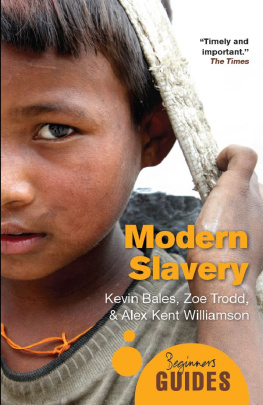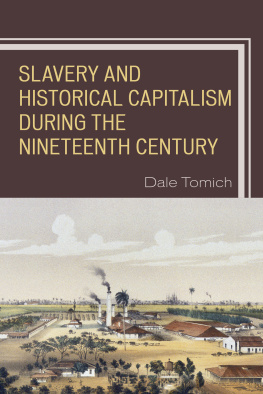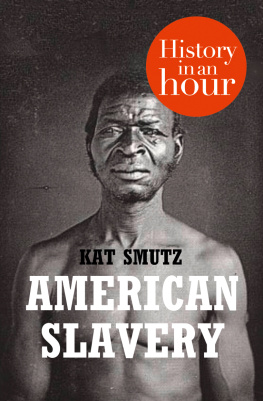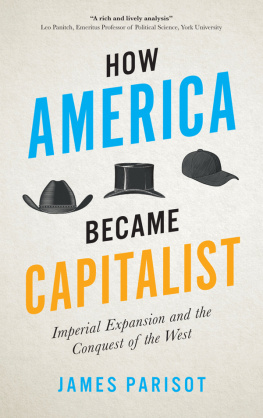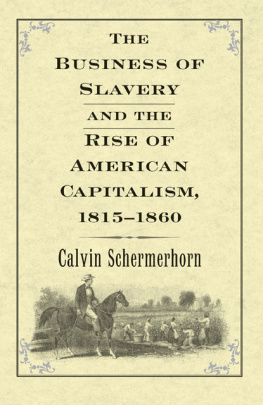The Half Has Never Been Told


Copyright 2014 by Edward E. Baptist
Published by Basic Books,
A Member of the Perseus Books Group
All rights reserved. No part of this book may be reproduced in any manner whatsoever without written permission except in the case of brief quotations embodied in critical articles and reviews. For information, address Basic Books, 250 West 57th Street, New York, NY 10107. Books published by Basic Books are available at special discounts for bulk purchases in the United States by corporations, institutions, and other organizations. For more information, please contact the Special Markets Department at the Perseus Books Group, 2300 Chestnut Street, Suite 200, Philadelphia, PA 19103, or call (800) 810-4145, ext. 5000, or e-mail .
Designed by Timm Bryson
Baptist, Edward E.
The half has never been told: slavery and the making of American capitalism / Edward E. Baptist.
pages cm
Includes bibliographical references and index.
ISBN 978-0-465-04470-2 (e-book)
1. SlaveryUnited StatesHistory. 2. SlaveryEconomic aspectsUnited StatesHistory. 3. African AmericansSocial conditionsHistory. I. Title.
E441.B337 2014
306.3620973--dc23
2014012546
10 9 8 7 6 5 4 3 2 1
For Ezra and Lillian
CONTENTS
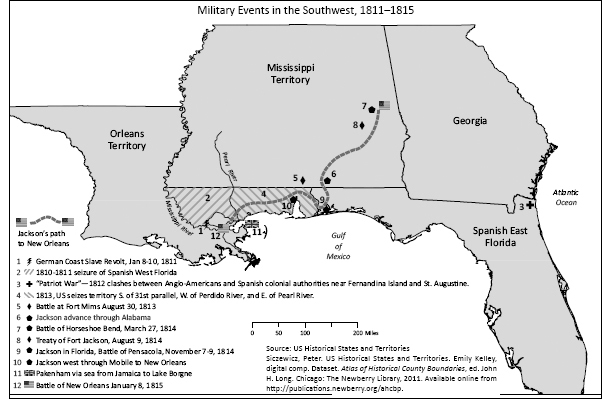
Major US Acquisitions of Cotton Land from Native American Nations, 18141840
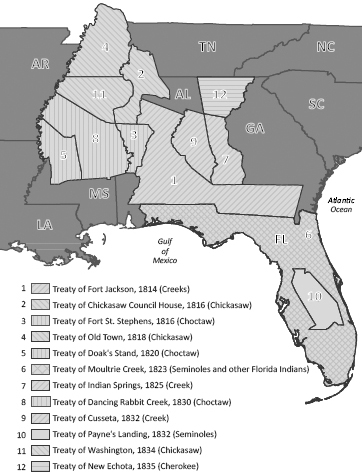
Source: US Historical States and Territories
Siczewicz, Peter. US Historical States and Territories. Emily Kelley, digital comp. Dataset. Atlas of Historical County Boundaries, ed. John H. Long. Chicago: The Newberry Library, 2011. Available online from http://publications.newberry.org/ahcbp.


Source: US Census, 1840, 1860.
Gray, L. C., and Esther Catherine Thompson, History of Agriculture in the Southern United States to 1860. Washington, DC: The Carnegie Institution of Washington, 1933.
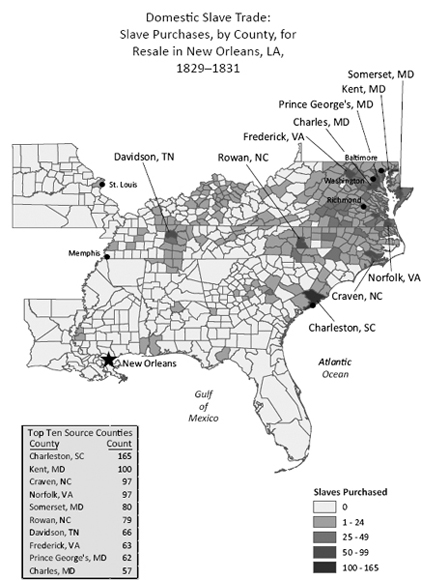

Source: US Historical Counties
Siczewicz, Peter. US Historical Counties. Dataset. Emily Kelley, digital comp. Atlas of Historical County Boundaries, ed. John H. Long.
Chicago: The Newberry Library, 2011. Available online from http://publications.newberry.org/ahcbp.


Source: US Census, 1800, 1840, and 1860.
A BEAUTIFUL LATE APRIL DAY, seventy-two years after slavery ended in the United States. Claude Anderson parks his car on the side of Holbrook Street in Danville. On the porch of number 513, he rearranges the notepads under his arm. Releasing his breath in a rush of decision, he steps up to the door of the handmade house and knocks.
Danville is on the western edge of the Virginia Piedmont. Back in 1865, it had been the last capital of the Confederacy. Or so Jefferson Davis had proclaimed on April 3, after he fled Richmond. Davis stayed a week, but then he had to keep running. The blue-coated soldiers of the Army of the Potomac were hot on his trail. When they got to Danville, they didnt find the fugitive rebel. But they did discover hundreds of Union prisoners of war locked in the tobacco warehouses downtown. The bluecoats, rescuers and rescued, formed up and paraded through town. Pouring into the streets around them, dancing and singing, came thousands of African Americans. They had been prisoners for far longer.
In the decades after the jubilee year of 1865, Danville, like many other southern villages, had become a cotton factory town. Anderson, an African-American masters student from Hampton University, would not have been able to work at the segregated mill. But the Works Progress Administration (WPA), a bureau of the federal government created by President Franklin D. Roosevelts New Deal, would hire him. To put people back to work after they had lost their jobs in the Great Depression, the WPA organized thousands of projects, hiring construction workers to build schools and artists to paint murals. And many writers and students were hired to interview older Americanslike Lorenzo Ivy, the man painfully shuffling across the pine board floor to answer Andersons knock.
Anderson had found Ivys name in the Hampton University archives, two hundred miles east of Danville. Back in 1850, when Lorenzo had been born in Danville, there was neither a university nor a city called Hamptonjust an American fort named after a slaveholder president. Fortress Monroe stood on Old Point Comfort, a narrow triangle of land that divided the Chesapeake Bay from the James River. Long before the fort was built, in April 1607, the Susan Constant had sailed past the point with a boatload of English settlers. Anchoring a few miles upriver, they had founded Jamestown, the first permanent English-speaking settlement in North America. Twelve years later, the crews of two storm-damaged English privateers also passed, seeking shelter and a place to sell the twenty-odd enslaved Africans (captured from a Portuguese slaver) lying shackled in their holds.
After that first 1619 shipload, some 100,000 more enslaved Africans would sail upriver past Old Point Comfort. Lying in chains in the holds of slave ships, they could not see the land until they were brought up on deck to be sold. After the legal Atlantic slave trade to the United States ended in 1807, hundreds of thousands more enslaved people passed the point. Now they were going the other way, boarding ships at Richmond, the biggest eastern center of the internal slave trade, to go by sea to the Mississippi Valley.
By the time a dark night came in late May 1861, the moon had waxed and waned three thousand times over slavery in the South. To protect slavery, Virginia had just seceded from the United States, choosing a side at last after six months of indecision in the wake of South Carolinas rude exit from the Union. Fortress Monroe, built to protect the James River from ocean-borne invaders, became the Unions last toehold in eastern Virginia. Rebel troops entrenched themselves athwart the forts landward approaches. Local planters, including one Charles Mallory, detailed enslaved men to build berms to shelter the besiegers cannon. But late this night, Union sentries on the forts seaward side saw a small skiff emerging slowly from the darkness. Frank Baker and Townshend rowed with muffled oars. Sheppard Mallory held the tiller. They were setting themselves free.
Next page

